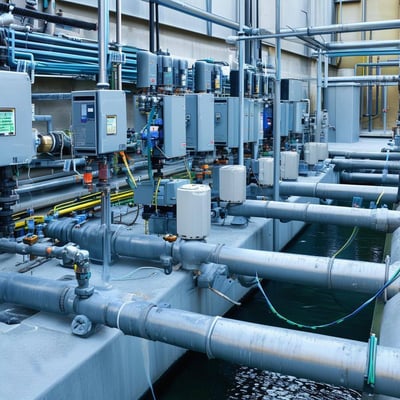
In today's rapidly evolving world, one industry facing a significant challenge is wastewater utilities. These utilities play a vital role in maintaining clean and safe water supplies, but they are struggling to recruit and retain a skilled workforce. Understanding the workforce crisis and the challenges faced by wastewater utilities is the first step towards finding sustainable solutions. By addressing the skills gap and leveraging technology, wastewater utilities can navigate the storm and ensure their long-term stability.
Understanding the Workforce Crisis in Wastewater Utilities
The workforce crisis in wastewater utilities stems from a combination of factors. One of the primary contributors is the aging workforce. Many experienced professionals in the industry are reaching retirement age, creating a vacuum of knowledge and expertise. Additionally, there is a lack of interest and awareness among younger generations about the rewarding career opportunities in this field. As a result, there is intense competition among utilities to attract and retain qualified employees.
Another critical factor contributing to the crisis is the complexity of the work. Wastewater utilities require a diverse set of skills, including engineering, chemistry, biology, and environmental science. Finding individuals who possess these skills and are willing to commit to a career in wastewater management can be a daunting task. This leads to frequent turnover and puts additional strain on the remaining workforce.
The technological advancements in wastewater treatment also play a significant role in the workforce crisis. As utilities adopt new and more sophisticated treatment processes to meet increasingly stringent environmental regulations, employees are required to undergo continuous training to stay updated with the latest technologies. This constant need for upskilling can be challenging for both the employees and the utilities, adding another layer of complexity to the workforce shortage.
Furthermore, the physical demands of working in wastewater utilities should not be overlooked. The job often involves working in harsh environmental conditions, handling hazardous materials, and being on call for emergencies 24/7. These factors can deter potential candidates from pursuing a career in this field, further exacerbating the workforce crisis.
Challenges Faced by Wastewater Utilities in Recruiting and Retaining Employees
Recruiting and retaining employees in the wastewater industry is no easy feat. Utilities face several challenges, including limited resources for recruitment efforts, competition from other sectors, and the negative perception of the industry.
Limited resources can hinder recruitment efforts, as wastewater utilities often have to operate within tight budgets. This restricts their ability to invest in comprehensive recruitment campaigns and attract top talent. Additionally, the industry faces competition from other sectors, such as technology and engineering, which often offer higher salaries and more attractive benefits packages.
A negative perception of the industry also poses a significant challenge. Many people may not fully understand the critical role wastewater utilities play in safeguarding public health and the environment. They may not perceive it as a rewarding or prestigious career choice. Changing this perception requires educational outreach and highlighting the importance of the industry's work.
Moreover, the wastewater industry is evolving rapidly, with advancements in technology and regulations shaping the landscape. This dynamic environment requires employees to adapt and upskill continuously, adding another layer of complexity to recruitment and retention efforts. Wastewater utilities must invest in training programs to ensure their workforce remains competitive and equipped to handle new challenges.
Furthermore, the physical demands of working in the wastewater sector can deter potential candidates. The job often involves working in challenging conditions, such as confined spaces and exposure to hazardous materials. Utilities must address these concerns by emphasizing workplace safety measures and providing proper training to ensure employee well-being.
Addressing the Skills Gap in Wastewater Utilities
To address the skills gap in wastewater utilities, a multi-faceted approach is needed. This includes investing in education and training programs, partnering with educational institutions, and implementing apprenticeship opportunities.
By investing in education and training programs, utilities can provide the necessary resources for individuals to develop the skills required in the industry. This can include scholarships, grants, and vocational training initiatives. Additionally, partnering with educational institutions can help create tailored curricula that align with the industry's needs, ensuring a pipeline of qualified candidates.
Implementation of apprenticeship opportunities can also be beneficial. This allows individuals to gain hands-on experience while working under experienced professionals. Apprenticeships not only help bridge the skills gap but also provide a structured career pathway for aspiring professionals.
Moreover, fostering a culture of continuous learning within wastewater utilities is essential. Encouraging employees to pursue further education, attend industry conferences, and participate in workshops can help them stay updated on the latest technologies and best practices in the field. This commitment to ongoing education not only benefits individual employees but also enhances the overall expertise within the organization.
Another crucial aspect of addressing the skills gap is promoting diversity and inclusion within the workforce. By actively seeking out and supporting individuals from underrepresented groups, wastewater utilities can tap into a wider talent pool and bring fresh perspectives to the industry. Embracing diversity not only fosters innovation but also creates a more inclusive and equitable work environment for all employees.
Leveraging Technology to Overcome Workforce Challenges in Wastewater Management
Technology can be a powerful tool in overcoming workforce challenges in wastewater management. Automation and smart systems can streamline processes, reduce the workload on employees, and improve efficiency.
Implementing advanced monitoring systems can help utilities detect issues and address them proactively, minimizing the need for manual intervention. Additionally, automation can handle mundane and repetitive tasks, freeing up employees to focus on more complex and critical aspects of their work.
Furthermore, the adoption of remote monitoring and predictive maintenance technologies can enable utilities to monitor and optimize their systems in real-time, reducing the need for on-site presence and maximizing the effectiveness of their resources.
One key aspect of leveraging technology in wastewater management is the use of data analytics. By collecting and analyzing data from various sensors and systems, utilities can gain valuable insights into their operations. This data-driven approach allows for better decision-making, improved resource allocation, and enhanced overall performance.
Moreover, the integration of artificial intelligence (AI) and machine learning algorithms can further enhance the capabilities of wastewater management systems. AI can help predict equipment failures, optimize treatment processes, and even suggest operational improvements based on historical data and real-time inputs.
Looking to the Future: Sustainable Solutions for Workforce Stability in Wastewater Utilities
To ensure long-term workforce stability in wastewater utilities, it is essential to look to the future and cultivate sustainable solutions. This includes fostering a culture of innovation, embracing diversity and inclusion, and promoting continuous professional development.
Cultivating a culture of innovation encourages employees to think creatively and seek innovative solutions to challenges. Empowering them to contribute ideas and participate in problem-solving initiatives can foster a sense of ownership and engagement, making the industry more attractive to both current and prospective employees.
For example, wastewater utilities can establish innovation hubs or incubators where employees are encouraged to collaborate and experiment with new technologies and processes. These hubs can serve as a platform for employees to share their ideas, receive feedback, and work together to develop innovative solutions. By creating an environment that values and rewards innovation, utilities can attract and retain top talent who are passionate about making a difference in the industry.
Embracing diversity and inclusion is crucial for creating a workforce that reflects the communities they serve. By promoting diversity in recruitment and providing equal opportunities for all, utilities can tap into a broader talent pool and benefit from different perspectives and ideas.
One way to promote diversity and inclusion is by partnering with local educational institutions and organizations that focus on underrepresented groups. By offering scholarships, internships, and mentorship programs, utilities can actively encourage individuals from diverse backgrounds to pursue careers in wastewater management. Additionally, creating employee resource groups that celebrate different cultures, ethnicities, and identities can foster a sense of belonging and promote an inclusive work environment.
Continuously investing in professional development opportunities is also vital. Providing employees with ongoing training, certifications, and career advancement programs not only enhances their skills but also demonstrates a commitment to their growth and success.
Wastewater utilities can collaborate with industry associations and educational institutions to develop specialized training programs that address the specific needs of the sector. These programs can cover a wide range of topics, from technical skills to leadership development, ensuring that employees have the knowledge and expertise to excel in their roles. Moreover, offering mentorship programs and career progression pathways can motivate employees to continuously improve and advance within the organization.
In conclusion, the workforce crisis in wastewater utilities is a complex issue that requires multifaceted solutions. By understanding the challenges, addressing the skills gap, leveraging technology, and embracing sustainable solutions, utilities can navigate this crisis and ensure a stable and qualified workforce for the future. With a concerted effort from the industry, we can overcome these challenges and continue providing essential wastewater management services for communities worldwide.



